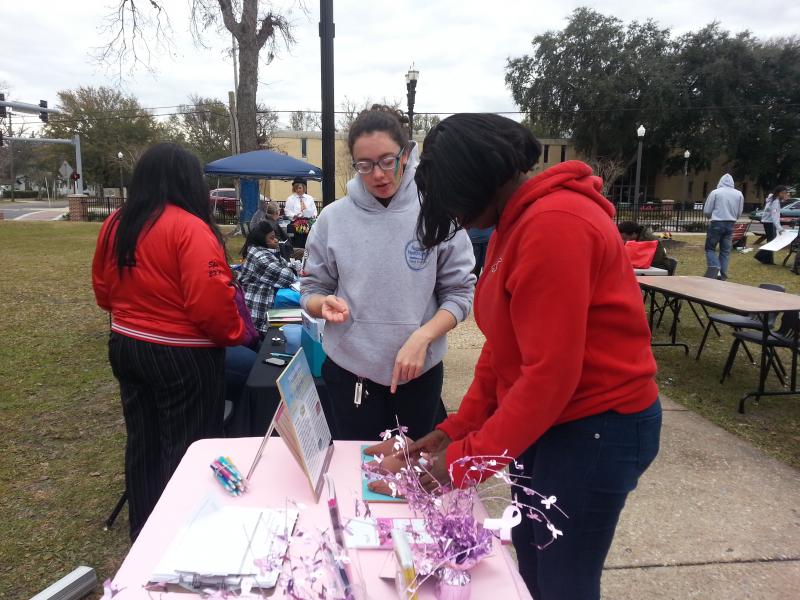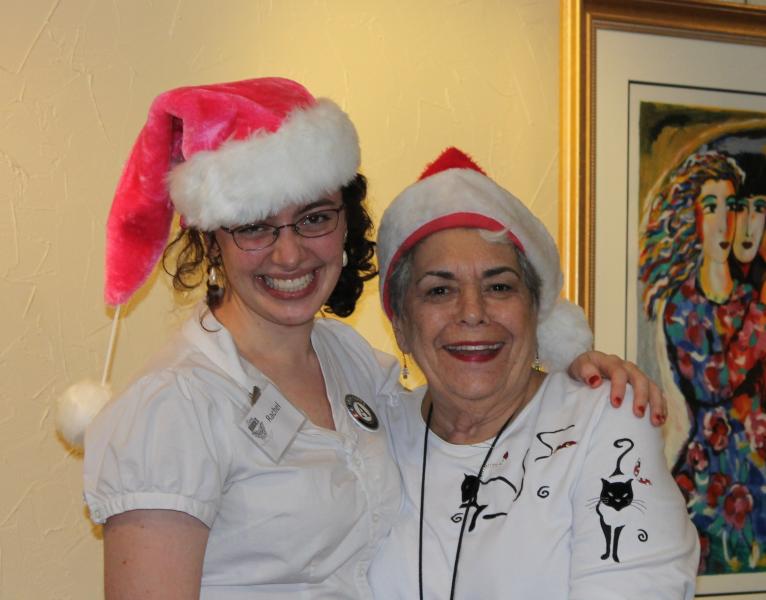What does it mean to be an advocate for women’s health? - An intergenerational conversation.
 |
| Rachel demonstrating breast self exams at the NFHC CommUNITY Day health fair as part of her service |
From the first time I read about Bosom Buddies, I was hooked. “The Bosom Buddies program, at the Women’s Center of Jacksonville, is dedicated to improving the lives of women affected by breast cancer. Compassionately and respectfully, we educate, support and advocate so that women are empowered to make informed decisions concerning their health.” As a student of gender and women’s studies, and a self-proclaimed advocate for women’s health, I knew this was a cause I could get behind.
Through my service as a North Florida Health Corps member, I connect recently diagnosed women to a network of peer support, help uninsured women to access mammograms, and educate the community about breast health. Several months in to my AmeriCorps term, I know firsthand that these services are deeply needed. The incidence rate for invasive breast cancer in Duval County is the 3rd highest in the state, with more than 600 women diagnosed each year1. Thirty-seven percent of Duval County women over the age of 40 have not had a mammogram in the last year2.
One of the most exciting aspects about serving with Bosom Buddies and the Women’s Center of Jacksonville is collaborating with people from multiple generations who are passionate about improving the lives of women. With this in mind, I got together with Bosom Buddies founder and support group facilitator, Bobbi de Córdova-Hanks, to discuss her 26 years with Bosom Buddies, and to have a conversation about what advocates for women’s health from our respective generations can learn from each other.
Rachel Picher: After you were first diagnosed with breast cancer, how did you become an active participant in your own care?
Bobbi de Córdova-Hanks: Well, I think when you sit across the table from somebody, and you face your own mortality, you don't want somebody to tell you that you’re leaving the Earth. You want to know what they’re gonna do to keep you here and save you. I've always been an activist, and I come from an activist family, and so I thought, “I’m gonna prove these **** wrong!”—I won’t use any four letter words—but I was angry!
I started Bosom Buddies because...I knew nothing. I was ignorant when I was diagnosed. I didn't do breast self-examination; I had never had a mammogram. I thought that by going to the gynecologist every six months, and having a breast check, I was cool. I thought, “Well, if you don't have breast cancer in your family, you don’t have to worry.” The words breast cancer never passed my lips. It was back in the closet in 1986.
RP: You said you were never taught how to do breast self exam? When you were younger and growing up, what did you learn about your body, and about keeping yourself healthy, and where did you learn it from?
BdCH: Well, I never learned about my body, I never learned about keeping it healthy. You have to remember that I'm almost 78 years old, okay? I was born in 1936. In those days you didn’t talk about your body. There was nothing in school to talk about your body. You know, when you got in school, even in high school, they thought it was a big deal to teach you how to make a hem on a skirt for home economics, or how to cook. You never talked about sex, or your body, or reproduction. Heaven forbid you should mention breasts!
RP: When you started to educate yourself on breast cancer advocacy, where did you go to find information?
BdCH: I got involved with the National Coalition for Cancer Survivorship. I learned from them the importance of standing up for your rights. I learned that everybody should have the right to insurance coverage, lifelong. That they should have the right to be free of the stigma of cancer as a dread disease. Why it was important to have research for breast cancer, why we needed to have certain laws passed. It was like going to school all over again. It was very intense.
I think, for me, the most awesome thing that ever happened, was to find myself at a Congressional hearing, standing at a podium with a microphone, talking to the Congress of the United States of America. Here I am, a Brooklyn born babe, it was so awesome to me that it brought tears to my eyes, because I thought, “Only in America could this happen,” you know? And they listen, they listen!
RP: What does being advocate for women’s health mean to you?
BdCH: You stand up for yourself first. Part, I think, of the role of an advocate is to make the medical profession see you as an individual, not the disease. I don't want them to walk in the door and go, “breast cancer patient number 42.” I want the doctor to say, “Oh, this is Bobbi de Córdova-Hanks. Let me look at her chart, and see if there's anything I should be reviewing.”
 |
| Rachel with her site mentor and breast cancer advocate, Bobbi de Córdova-Hanks, at the Bosom Buddies Program holiday party |
I want to be able, as an advocate, to teach women that's their right. I've been there, done that, I know how difficult that is. An advocate stands up for their own rights, as well as others. So, I wanted to be able to stand up for other people, to be able to change laws, to be able to change health policies, to be able to make it a better world for people, so that they get the treatment, the time they deserve, and a better chance to live.
For instance, when I left the National Coalition for Cancer Survivorship I went directly to the board of the Intercultural Cancer Council. Now, that's the world's largest multicultural, multidisciplinary, organization, dedicated to removing the disparities in cancer care for ethnic and racial minorities and the poor. That was a whole other world for me, to know that people of color and people from different ethnic origins are treated differently. Sometimes they don’t get the same drugs, they don’t get the same treatment, they certainly don’t get the same respect. It's disgusting.
I want to see race-specific research to find out why the incidence of breast cancer is less for women of color and different ethnicities than for Caucasian women, and why the mortality rate is so much higher. Why, after 27 years, are they still dying so much more than Caucasian women? Why is that? Why is nobody looking at that?
RP: You’ve worked with young breast cancer survivors, and younger advocates for women’s health. What do you find exciting about the way this generation is organizing?
BdCH: I think it’s fabulous. I mean, the sad thing for me is I don't have anything in common with most women my age, because I don't sit there, and go out to lunch, and sit in a chair and knit, and talk about my grandchildren. I want to make a difference in the world.
Young people are coming up, wanting to make that difference, starting a young age. They realize, these young survivors, that they face incredible odds in living a normal life. But, they’re organizing young survivors’ coalitions; they are making sure that the lawmakers know that they have all kinds of different problems than we had. They are not standing for the medical abuse that we as older women had. They’re a force to be reckoned with. And I’m very proud of that.
RP: So, finally, do you have any advice to give to younger advocates for women’s health from the lessons that you’ve learned?
BdCH: I guess the biggest thing is: don't be awed by somebody in a higher position. Don’t be awed by somebody who is a Senator, or Congressman, or whatever. Not everyone is a brilliant person; not everyone really cares. Don't be afraid to speak to them from your heart. Don't be afraid to tell your story. Don't be afraid to be a proud survivor, and do everything you can to stay healthy: mentally and physically. That's the biggest thing. Take care of yourself.